仁爱科普版八年级上册Unit 3 Our Hobbies Topic 1知识点课件(共45张PPT)
文档属性
| 名称 | 仁爱科普版八年级上册Unit 3 Our Hobbies Topic 1知识点课件(共45张PPT) | 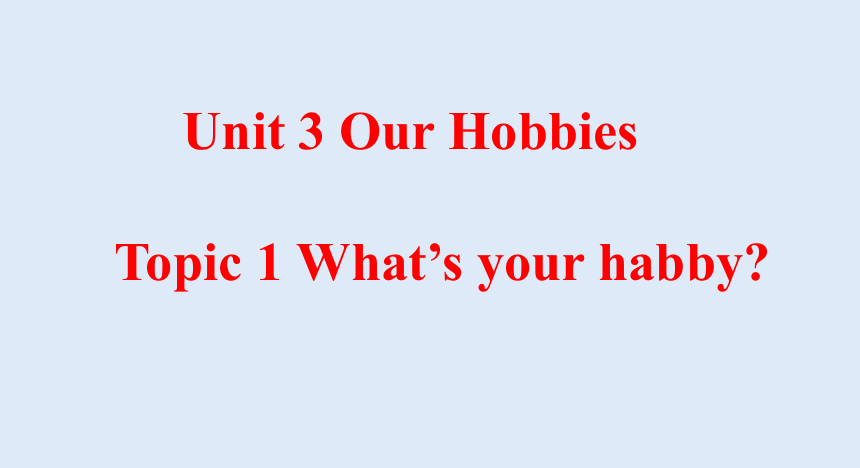 | |
| 格式 | pptx | ||
| 文件大小 | 773.6KB | ||
| 资源类型 | 教案 | ||
| 版本资源 | 仁爱科普版 | ||
| 科目 | 英语 | ||
| 更新时间 | 2023-07-13 17:40:29 | ||
图片预览

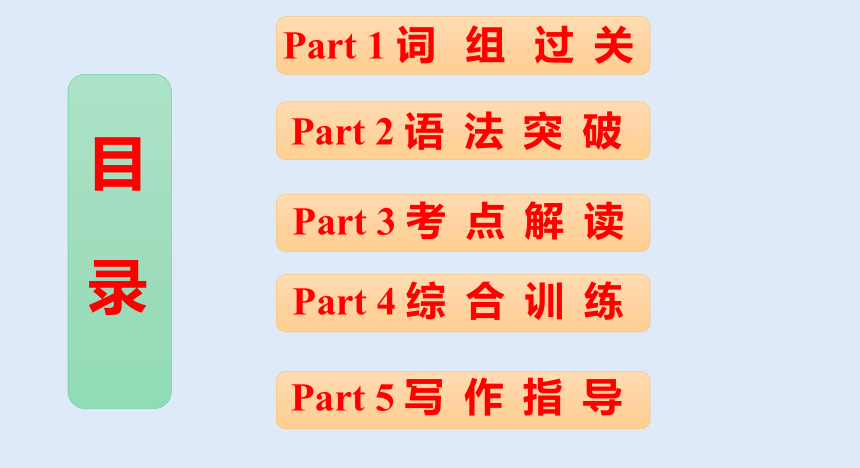
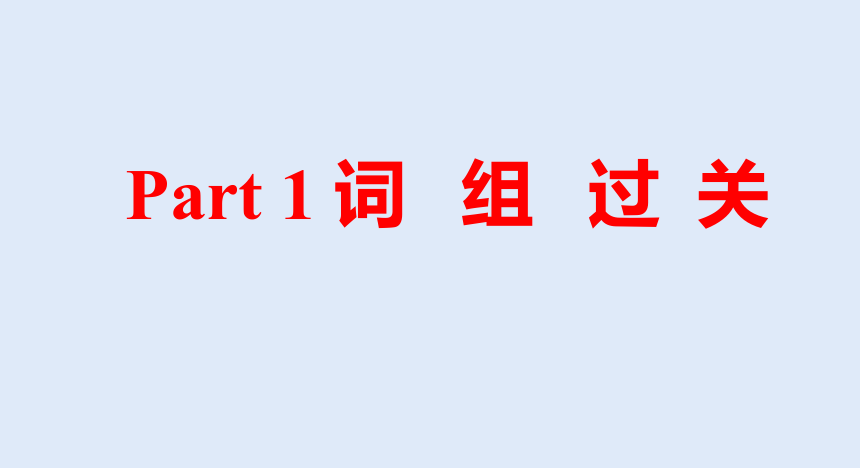
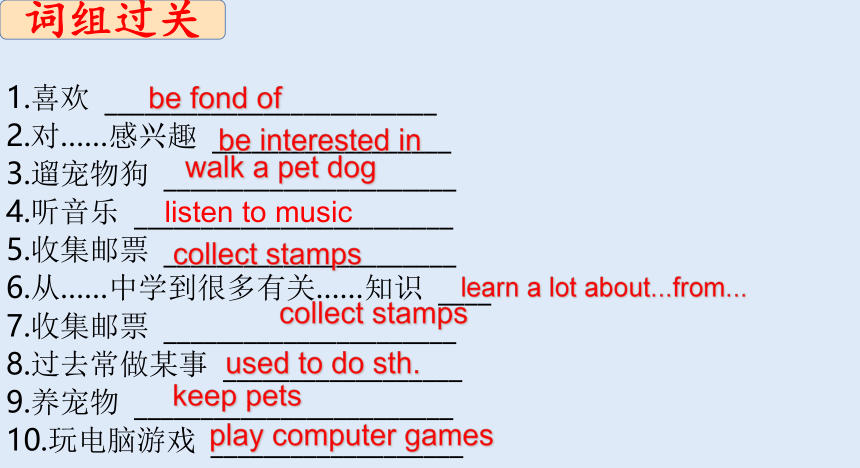
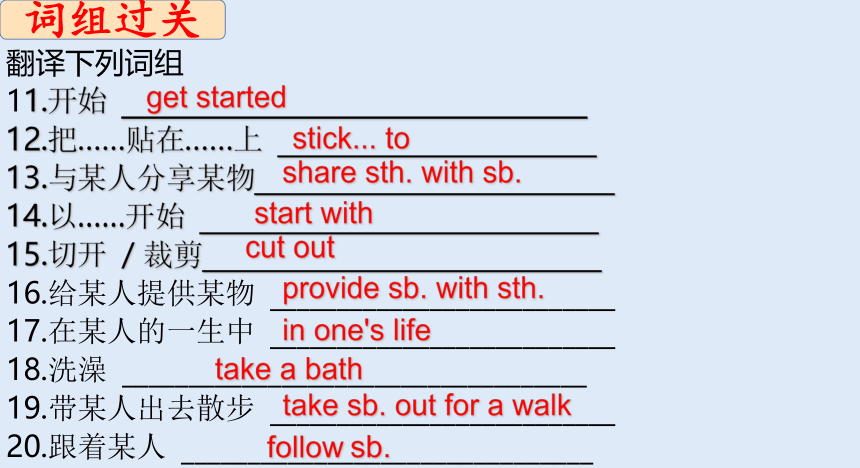
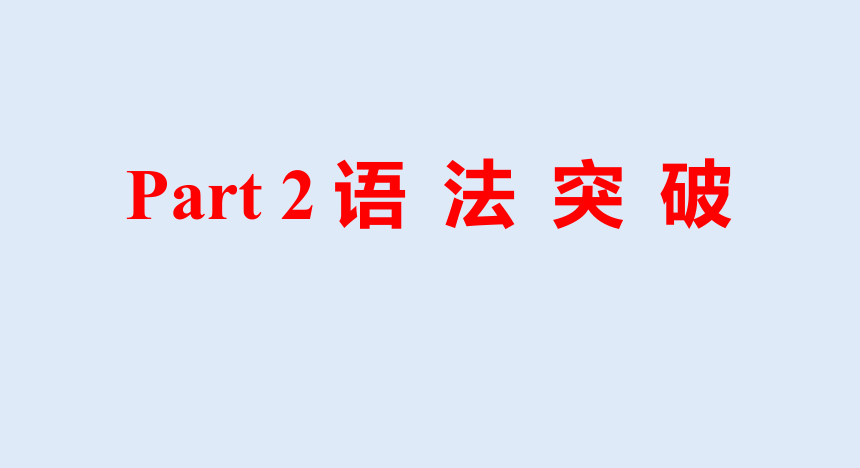
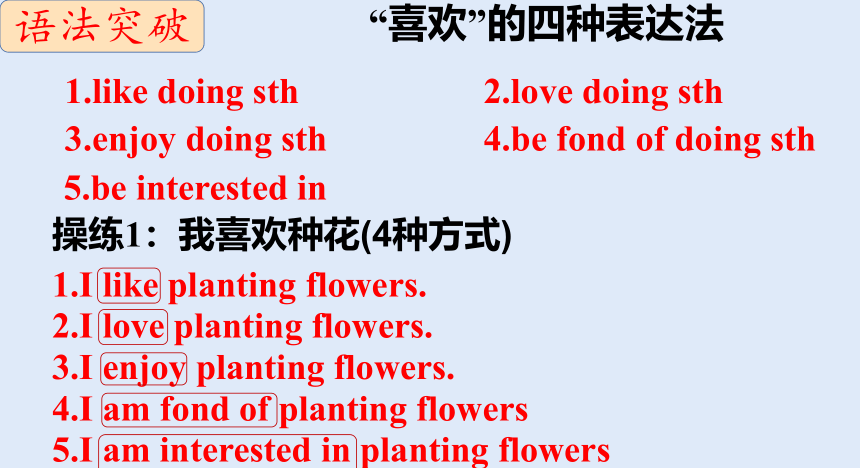
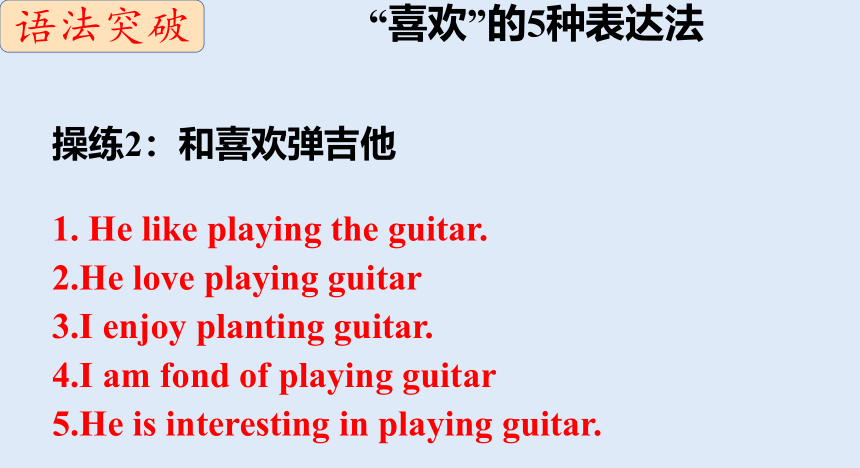
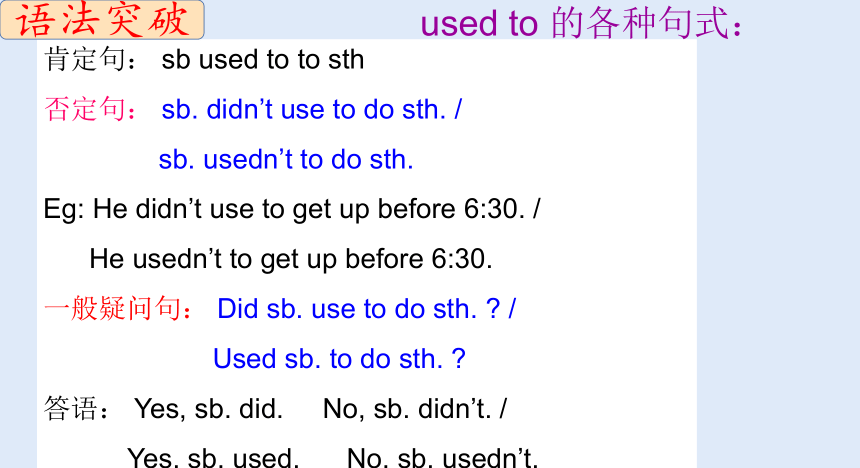
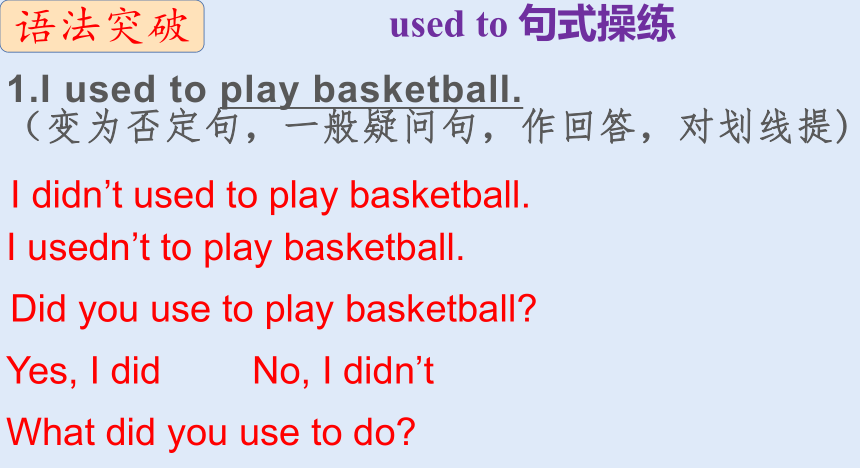
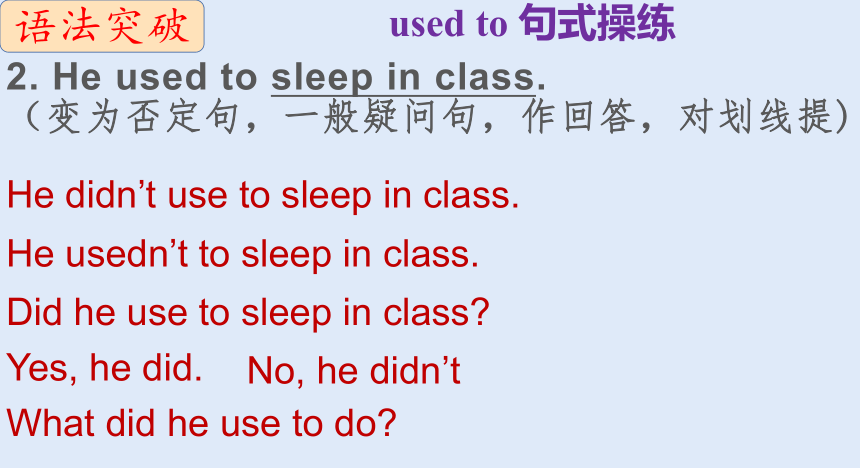
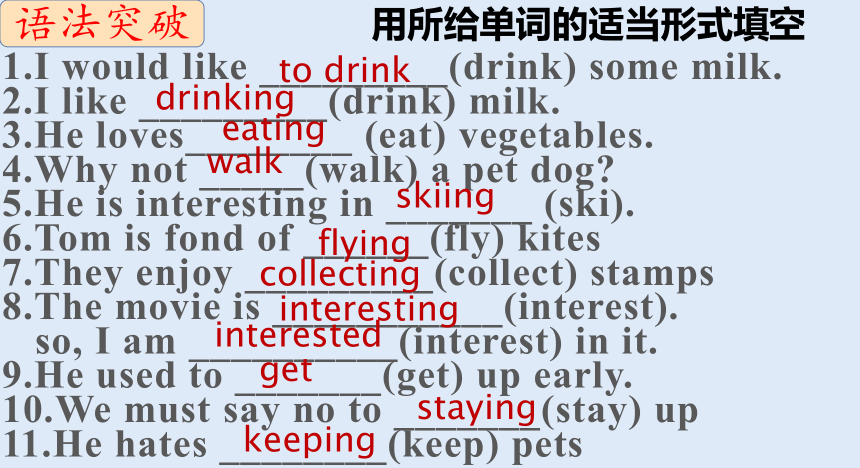
文档简介
(共45张PPT)
Unit 3 Our Hobbies
Topic 1 What’s your habby
目
录
Part 1 词 组 过 关
Part 5 写 作 指 导
Part 4 综 合 训 练
Part 3 考 点 解 读
Part 2 语 法 突 破
Part 1 词 组 过 关
1.喜欢 _________________________
2.对……感兴趣 __________________
3.遛宠物狗 ______________________
4.听音乐 ________________________
5.收集邮票 ______________________
6.从……中学到很多有关……知识 ____
7.收集邮票 ______________________
8.过去常做某事 __________________
9.养宠物 ________________________
10.玩电脑游戏 ___________________
be fond of
be interested in
walk a pet dog
listen to music
collect stamps
learn a lot about...from...
collect stamps
used to do sth.
keep pets
play computer games
词组过关
翻译下列词组
11.开始 ___________________________________
12.把……贴在……上 ________________________
13.与某人分享某物___________________________
14.以……开始 ______________________________
15.切开 / 裁剪______________________________
16.给某人提供某物 __________________________
17.在某人的一生中 __________________________
18.洗澡 ___________________________________
19.带某人出去散步 __________________________
20.跟着某人 _______________________________
get started
stick... to
share sth. with sb.
start with
cut out
provide sb. with sth.
in one's life
take a bath
take sb. out for a walk
follow sb.
词组过关
Part 2 语 法 突 破
“喜欢”的四种表达法
1.like doing sth
2.love doing sth
3.enjoy doing sth
4.be fond of doing sth
操练1:我喜欢种花(4种方式)
1.I like planting flowers.
2.I love planting flowers.
3.I enjoy planting flowers.
4.I am fond of planting flowers
5.I am interested in planting flowers
5.be interested in
语法突破
“喜欢”的5种表达法
操练2:和喜欢弹吉他
1. He like playing the guitar.
2.He love playing guitar
3.I enjoy planting guitar.
4.I am fond of playing guitar
5.He is interesting in playing guitar.
语法突破
肯定句: sb used to to sth
否定句: sb. didn’t use to do sth. /
sb. usedn’t to do sth.
Eg: He didn’t use to get up before 6:30. /
He usedn’t to get up before 6:30.
一般疑问句: Did sb. use to do sth. /
Used sb. to do sth.
答语: Yes, sb. did. No, sb. didn’t. /
Yes, sb. used. No, sb. usedn’t.
used to 的各种句式:
语法突破
1.I used to play basketball.
(变为否定句,一般疑问句,作回答,对划线提)
I didn’t used to play basketball.
I usedn’t to play basketball.
Did you use to play basketball
Yes, I did
No, I didn’t
What did you use to do
used to 句式操练
语法突破
2. He used to sleep in class.
(变为否定句,一般疑问句,作回答,对划线提)
He didn’t use to sleep in class.
He usedn’t to sleep in class.
Did he use to sleep in class
Yes, he did.
No, he didn’t
What did he use to do
used to 句式操练
语法突破
1.I would like _________(drink) some milk.
2.I like _________(drink) milk.
3.He loves________ (eat) vegetables.
4.Why not _____(walk) a pet dog
5.He is interesting in _______ (ski).
6.Tom is fond of ______(fly) kites
7.They enjoy _________(collect) stamps
8.The movie is ___________(interest).
so, I am __________(interest) in it.
9.He used to _______(get) up early.
10.We must say no to _______(stay) up
11.He hates ________(keep) pets
to drink
drinking
eating
walk
skiing
flying
collecting
interesting
interested
get
staying
keeping
语法突破
用所给单词的适当形式填空
Part 3 考 点 解 读
知识点01 in one’s free time在某人的业余时间
in one’s free time在某人的业余时间,相当于in one’s spare time。
I often play soccer in my free time
我经常在空闲时间踢足球吗?
【即学即练】
What does your brother often do _________ his free time
A.on B.free C.in
答案:C
【解析】句意:你哥哥经常在空闲时间做什么?考查词组in my free time 。
知识点02 enjoy doing sth 喜欢做某事(教材Page 55 1a)
enjoy意为“喜欢,享受...的乐趣”。
enjoy sth/doing sth,喜欢做某事。enjoy oneself=have a good time,意为“玩得开心”。
而单独一句enjoy yourself是指“祝你玩得愉快!”
【典例】I always enjoy ___________(visit) London, but I wouldn’t like to live there.
答案:visiting
【解析】考查enjoy doing sth,意为“喜欢做某事”。
知识点03 maybe 也许,大概(教材Page 55 1a)
maybe是副词,意为“也许,大概”,相当于perhaps.
Maybe he is at the bus station now.也许他现在在公交车站。
may be是情态动词may 后接动词原形be,作谓语。
He may be at the school now.他现在可能就在学校里了。
【典例】------Where is Sally ------I’m not sure. ______ she is in the library.
A.May B.May be C.Maybe
答案:C
【解析】句中已有谓语动词is, 所以不能再选动词may be,排除B;may是情态动词,后面要接动词原形,也排除,故选C。
知识点4 be interested in 对...感兴趣(教材Page 56 1a)
be interested in 对...感兴趣,后接名词,代词,动名词。
Kate’s sister is interested in collecting stamps.Kate’s sister is interested in collecting stamps.
【典例】Sam is __________in reading. He thinks reading is___________.
A.interested; interest B.interesting; interested C.interested;interesting
答案:C
【解析】interested 意为“感兴趣的”,指人;interesting意为“令人感兴趣的”,指物。故选C。
知识点05 be fond of 喜欢(教材Page 55 1a)
be fond of意为“喜欢”,后接名词,代词或动名词。
She is fond of watching movies.She is fond of watching movies.
【典例】
Mary is fond of _____________(play) the piano very much.
答案:playing
【解析】考查be fond of doing sth。
知识点06 change的用法(教材Page 55 1a)
(1)作动词,意为“改变”。
You should change the bus at the next bus stop.
你应该在下一个公交车站换车。
(2)作可数名词,指变化。
There are some changes in my hometown我的家乡有一些变化
(2)作不可数名词,意为“零钱”。
Here is your change找你零钱。
典例】You should ____________________________ (换衣服)often
答案:change your clothes
知识点07 表达爱好的句子(教材Page 55-56)
(1)love/like doing sth
I like reciting poems我喜欢背诵诗歌
(2)be fond of sth/doing sth
I am fond of listening to music我喜欢听音乐。
(3)enjoy sth/doing sth
I enjoy going shopping.我喜欢听音乐
(4)be interested in sth/doing sth
Are you interested in reading 你有兴趣阅读吗?
(5)prefer doing sth(to doing sth)
知识点08 must be 一定,肯定 (教材Page 57 1 a)
must be意为“一定,肯定”,表示把握性大的推测,用于肯定句。
may be 意为“可能是”,表示把握性小的推测,相当于 can be。
can’t be 意为“不可能是”,表示否定的推测。
【典例】
-----Listen! I think it __________ be Mr.White singing in the office.
----No, It __________ be him. He left for London just now.
A.must;mustn’t B.may; mustn’ C.must;can’t
【答案】C
【解析】前一句指把握性大的推测,因为听到他在唱歌。后一句指否定推测,因为他去伦敦了。故选C。
知识点09 a lot 很,许多,大量(教材Page57 1a)
a lot of 许多,大量
a lot 是副词词组,意为“很,非常,许多,大量”,修饰前面的动词。
I should practice a lot .我应该经常练习。
a lot of 是形容词词组,意为“许多,大量”,相当于lots of,修饰其后的名词。
I ate a lot of apples yesterday.我昨天吃了很多苹果。
【典例】Collecting things can help you learn _______ about history.
A.a lot B.lots of C.a lot of
【答案】A
【解析】修饰前面的动词learn,所以用副词词组a lot.
知识点10. hate的用法 (教材Page 57 1a)
hate意为“厌恶,讨厌”,其后可接动词不定式或动名词。意思略有区别。
hate doing sth指经常性的动作,而hate to do sth 指某次具体的动作。
I hate listening to rock music.指一直讨厌停摇滚乐。
I hate to go out tonight.指只是今晚讨厌出去。
【典例】John always hates _______________(do) homework.
【答案】doing
【解析】hate doing sth指经常性动作。
知识点11 used to do sth 过去常常做某事(教材Page55-62 )
be used to do sth 习惯于做某事
be used to do sth 被用来做某事
(1)used to do sth 过去常常做某事
I used to read book in the morning
(2)be used to do sth 习惯于做某事,相当于get used to doing sth
She is used to playing the piano after school every day.
(3)be used to do sth 被用来做某事
The knife can be used to cut the apple.
【典例】Li Mei ___________ up late. But now she gets up at six every morning now.
A.used to get B.is used to getting C.is used to get
A
知识点12 有关cut的词组小结 (教材Page 59 1 a)
cut作动词,意为“剪,切,割”;cut还可以做名词,意为“伤口,开口”。常用短语有:
cut down 把…砍倒
cut off 切掉,切断
cut out 剪下
【典例】He_________ the picture from today’s newspaper.
【答案】cut out
【解析】句意:他从今天的报纸上剪出图片。 cut out剪出。
知识点13 Paper 的用法(教材Page 59 1a)
paper作名词,意为“纸”时,是不可数名词,若要表示数量要用piece修饰,如:
two pieces of paper
paper 还可以作可数名词,意为“文件,试卷,报纸”。如:
He is reading a paper.
【典例】I need ____________________________(一张纸) to use.
【答案】a piece of paper
【解析】paper作名词,意为“纸”时,是不可数名词,若要表示数量要用piece修饰
知识点14 stick 的用法(教材Page 59 1a)
(1)stick 可作动词,意为“粘住”,其过去式是stuck。词组stick sth to意为“把...粘贴到...”。
stick to doing sth意为“坚持做某事”。
Can you stick the picture to the wall。
He stick to practicing English every day.
(2)stick 也可作名词,意为“木棒,枝条”。
He passes the stick to me quickly.
【典例】----Could you help me ________ these posters to the wall
----Yes, with pleasure.
【答案】stick 【解析】句意:你能帮我把这些海报到墙上吗?stick to意为“粘帖”。
知识点15 What did you use to do (教材Page 59 1a)
What did you use to do =what did you often do in the past 意为你过去常常做什么。用来询问过去的爱好。
【典例】Linda used to fly kites in fall (对画线部分提问)
______________________________________________
【答案】What did Linda use to do in fall
【解析】used to变为否定句借助动词didn’t, 变为疑问句把did提前。
What did he use to do in spring
知识点16 everyday,every day辨析 (教材Page 61 1 a)
everyday 意为“日常的,每日的”,是形容词,作定语,后面接名词。every day 意为“每天”,是个名词词组,做时间状语。
I will buy some everything thing tomorrow.我明天都买一些东西。
I go shopping every day.我每天都去购物。
【典例】----What do you think of the Internet
-----I think it has become part of people’s _________ life.
A.every day B.everyday C.any day
答案:B
【解析】everyday 意为“日常的,每日的”,是形容词,作定语,后面接名词。后面有名词life.故选B.
知识点17 provide sb with sth 提供某人某物(教材Page 61 1a)
provide 动词,意为“提供”。provide sb with sth=provide sth for sb 为某人提供某物。
Our parents provide us with the things we need.我们的父母为我们提供了我们需要的东西。
No one can provide us with a good future(改为同义句)
【典例】No one can ________ a good future ________ us.
答案:provide,for
【解析】provide sb with sth=provide sth for sb 为某人提供某物。
知识点18 be special to 患感冒(教材Page 61 1a)
special形容词,意为“特别的,专门的”。 be special to sb对某人来说是特别的。
【典例】For your birthday, I have a __________ present to you.
A.special B.difficult C.crazy
答案:A
【解析】句意:为了你的生日,我有一个特别的礼物送给你。A.special 特别的;B.difficult 困难的;
知识点19 多义词light的用法(教材Page 61 1a)
light 有以下用法:
(1)作名词,意为“光”。
I try to see but I'm blinded by the white light.
我试着去看,但是有道白光让我什么都看不到。
(2)作名词,意为“灯”。
He turned off the light before going out. 他出门前把灯关掉。
(3)作形容词,意为“轻的”,“淡的”。
The box is light. I can lift it.盒子很轻。我可以把它举起来。
He lit a match quickly.他很快点燃了一场火柴
【典例】Her favorite color is __________ __________(浅红色)
答案:light red
解析:light作形容词,意为“轻的”,“淡的”。
Part 4 综合训练
根据情景提示或图画、提示词,完成下列句子:
1.你想知道朋友在业余时间通常做什么,可以这样问:
_______________________________________________
2.你建议朋友出去做些户外活动,可以这样说:
_______________________________________________
3.你想知道新朋友的爱好是什么,可以这样问:
_______________________________________________
4.enjoy ____________________________________________
5.favorite,hobby_____________________________________
What do you usually do in your free time
Why not go out and do some outdoor activities
What's your hobby
They enjoy climbing mountains.
Her favorite hobby is planting trees.
句型操练
Section A
根据情景提示或图画、提示词,完成下列句子:
1.你看到朋友新买的漂亮连衣裙时由衷地赞美到:
_______________________________________________!
2.你想知道朋友过去有什么爱好,可以这样问:
_______________________________________________
3.你想把集邮册给朋友看,你可以这样问:
Would you like__________________________________
4.used to,like _____________________________________.
5.fond,collect ____________________________________.
What a beautiful dress
What hobby did you use to have
to see my stamp collection
He used to like playing soccer
He is fond of collecting coins
Section B
句型操练
根据情景提示或图画、提示词,完成下列句子:
1.你想知道朋友过去在春天常做什么,可以这样问:
_______________________________________________
2.你告诉朋友你过去常去旅行,可以这要说:
_______________________________________________.
3.老师想了解同学们有什么爱好,她这样问:
_______________________________________________
4.used to,fall _______________________________________
5.interested,make ___________________________________
What did you use to do in spring
I used to go traveling
What hobbies do you have
They used to climb mountains in fall.
He is interested in making model planes.
Section C
句型操练
根据情景提示或图画、提示词,完成下列句子:
1.你告诉朋友你喜欢唱歌、弹钢琴,你可以这样说:
______________________________________________.
2.你告诉朋友宠物狗给你的生活带来快乐,可以这样说:
My pet dog_____________________________________.
3.你想知道朋友最喜欢什么宠物,可以这样问:
_____________________________________________
4.used to,winter ___________________________________
5.prefer,fall ______________________________________
I like/ love/ enjoy/ am fond of singing and playing the piano
provides me with happiness in my life
What's your favorite pet
They used to make snowmen in winter.
He prefers cycling in fall.
Section D
句型操练
1.He wrote a ____________(/’p uim/) for his grandmother for her 80th birthday.
2.There is a stamp _________ (collect) in the city hall next Monday. 3.My grandpa enjoys ____________ (walk) after supper.
4.The story sounds ___________ (interest). I want to listen to it again.
5.A lot of old people ____________ (/heit/) rock music. It’s too noisy.
6.He is very ______ (/’leizi/). He always asks his mother to do everything for him.
7.Thanks for your _______ ( ‘intr dΛk∫n/). I know a lot about this city.
8.Tom is _________ in making cards. He is crazy about it.
9.Collecting stamps may bring people___________(happy) and knowledge.
poem
collection
walking
interesting
hate
lazy
introduction
interested
happiness
综合运用
选择填空:
( )1. How many students enjoy __________ in your class
A. skate B. go skating C. skating
( )2, —Let’s go for a picnic this Sunday. —_______wonderful!
A. Listens B. Sounds C. Hears
( )3. Does he love playing ____basketball or playing____piano
A. the, / B. /, the C. /, /
( )4. I’m interested _____ basketball, but Tm not good _____ it.
A. on, in B. with, for C. in, at
( )5. He preferred ______ rather than_______ TV.
A. reading, to watching B. to read, watch C. to read, watching
C
B
B
C
A
综合运用
( )1.I _________ drive in the past. I used to take the bus.
A. could B. couldn't C. should
( )2. Edward with his family _________living in China.
A. enjoy B. enjoys C. want
( )3. You may _______the book for two weeks.
A. keep B. borrow C. lend
( )4. He likes eating vegetables______ ,tomatoes and cabbages.
A. such as B. such C. likes
( )5. We should keep our classroom______.It's good for our health.
A. clean B. cleaning C. cleans
B
B
B
A
A
综合运用
阅读下面短文,根据以下提示:1)所给词的适当形式,2)语境提示,3)音标提示,在每个空 格内填入一个适当的单词,所填单词要求意义准确,拼写正确:
Different people have different 1_________ (hobby). I used to listen to music in my 2________time. 3__________ (listen) to music helped me relax when I was 4________ (/’tai d/). It also brought me 5___________(/'kΛmf t/). But my interests are 6__________ (change) all the time. Now my hobbies are sports like playing basketball and7 _________ (swim). I think playing basketball 8________ me strong. Swimming is a good way to 9________ fit, and it can help to keep my heart and lungs 10________ (/’helθi/). What hobbies do you have Can you tell me
hobbies
free
listening
changing
comfortable
swimming
make
keep
healthy
tired
综合运用
Part 5 写 作 指 导
话题作文
依照下列问句,以My Hobbies为题写一篇60词左右的短文。
1. What hobbies did you use to have Why did you like them
2. What hobbies do you have now Why do you like them
3. What different hobbies do you have in different seasons
My Hobbies
Different people have different hobbies. I used to ride a bike and read story books. They could give us lots of knowledge. I keep cats and dogs. I thought pets were very friendly and lovely, but now I like listening to music and chatting on the Internet, because music can relax me after the daily work and chatting can bring me happiness and friendship.
I have different hobbies in different seasons. In spring I like flying kites. In summer I go swimming. I often climb hills in the fall. I like making snowmen best in winter.
Unit 3 Our Hobbies
Topic 1 What’s your habby
目
录
Part 1 词 组 过 关
Part 5 写 作 指 导
Part 4 综 合 训 练
Part 3 考 点 解 读
Part 2 语 法 突 破
Part 1 词 组 过 关
1.喜欢 _________________________
2.对……感兴趣 __________________
3.遛宠物狗 ______________________
4.听音乐 ________________________
5.收集邮票 ______________________
6.从……中学到很多有关……知识 ____
7.收集邮票 ______________________
8.过去常做某事 __________________
9.养宠物 ________________________
10.玩电脑游戏 ___________________
be fond of
be interested in
walk a pet dog
listen to music
collect stamps
learn a lot about...from...
collect stamps
used to do sth.
keep pets
play computer games
词组过关
翻译下列词组
11.开始 ___________________________________
12.把……贴在……上 ________________________
13.与某人分享某物___________________________
14.以……开始 ______________________________
15.切开 / 裁剪______________________________
16.给某人提供某物 __________________________
17.在某人的一生中 __________________________
18.洗澡 ___________________________________
19.带某人出去散步 __________________________
20.跟着某人 _______________________________
get started
stick... to
share sth. with sb.
start with
cut out
provide sb. with sth.
in one's life
take a bath
take sb. out for a walk
follow sb.
词组过关
Part 2 语 法 突 破
“喜欢”的四种表达法
1.like doing sth
2.love doing sth
3.enjoy doing sth
4.be fond of doing sth
操练1:我喜欢种花(4种方式)
1.I like planting flowers.
2.I love planting flowers.
3.I enjoy planting flowers.
4.I am fond of planting flowers
5.I am interested in planting flowers
5.be interested in
语法突破
“喜欢”的5种表达法
操练2:和喜欢弹吉他
1. He like playing the guitar.
2.He love playing guitar
3.I enjoy planting guitar.
4.I am fond of playing guitar
5.He is interesting in playing guitar.
语法突破
肯定句: sb used to to sth
否定句: sb. didn’t use to do sth. /
sb. usedn’t to do sth.
Eg: He didn’t use to get up before 6:30. /
He usedn’t to get up before 6:30.
一般疑问句: Did sb. use to do sth. /
Used sb. to do sth.
答语: Yes, sb. did. No, sb. didn’t. /
Yes, sb. used. No, sb. usedn’t.
used to 的各种句式:
语法突破
1.I used to play basketball.
(变为否定句,一般疑问句,作回答,对划线提)
I didn’t used to play basketball.
I usedn’t to play basketball.
Did you use to play basketball
Yes, I did
No, I didn’t
What did you use to do
used to 句式操练
语法突破
2. He used to sleep in class.
(变为否定句,一般疑问句,作回答,对划线提)
He didn’t use to sleep in class.
He usedn’t to sleep in class.
Did he use to sleep in class
Yes, he did.
No, he didn’t
What did he use to do
used to 句式操练
语法突破
1.I would like _________(drink) some milk.
2.I like _________(drink) milk.
3.He loves________ (eat) vegetables.
4.Why not _____(walk) a pet dog
5.He is interesting in _______ (ski).
6.Tom is fond of ______(fly) kites
7.They enjoy _________(collect) stamps
8.The movie is ___________(interest).
so, I am __________(interest) in it.
9.He used to _______(get) up early.
10.We must say no to _______(stay) up
11.He hates ________(keep) pets
to drink
drinking
eating
walk
skiing
flying
collecting
interesting
interested
get
staying
keeping
语法突破
用所给单词的适当形式填空
Part 3 考 点 解 读
知识点01 in one’s free time在某人的业余时间
in one’s free time在某人的业余时间,相当于in one’s spare time。
I often play soccer in my free time
我经常在空闲时间踢足球吗?
【即学即练】
What does your brother often do _________ his free time
A.on B.free C.in
答案:C
【解析】句意:你哥哥经常在空闲时间做什么?考查词组in my free time 。
知识点02 enjoy doing sth 喜欢做某事(教材Page 55 1a)
enjoy意为“喜欢,享受...的乐趣”。
enjoy sth/doing sth,喜欢做某事。enjoy oneself=have a good time,意为“玩得开心”。
而单独一句enjoy yourself是指“祝你玩得愉快!”
【典例】I always enjoy ___________(visit) London, but I wouldn’t like to live there.
答案:visiting
【解析】考查enjoy doing sth,意为“喜欢做某事”。
知识点03 maybe 也许,大概(教材Page 55 1a)
maybe是副词,意为“也许,大概”,相当于perhaps.
Maybe he is at the bus station now.也许他现在在公交车站。
may be是情态动词may 后接动词原形be,作谓语。
He may be at the school now.他现在可能就在学校里了。
【典例】------Where is Sally ------I’m not sure. ______ she is in the library.
A.May B.May be C.Maybe
答案:C
【解析】句中已有谓语动词is, 所以不能再选动词may be,排除B;may是情态动词,后面要接动词原形,也排除,故选C。
知识点4 be interested in 对...感兴趣(教材Page 56 1a)
be interested in 对...感兴趣,后接名词,代词,动名词。
Kate’s sister is interested in collecting stamps.Kate’s sister is interested in collecting stamps.
【典例】Sam is __________in reading. He thinks reading is___________.
A.interested; interest B.interesting; interested C.interested;interesting
答案:C
【解析】interested 意为“感兴趣的”,指人;interesting意为“令人感兴趣的”,指物。故选C。
知识点05 be fond of 喜欢(教材Page 55 1a)
be fond of意为“喜欢”,后接名词,代词或动名词。
She is fond of watching movies.She is fond of watching movies.
【典例】
Mary is fond of _____________(play) the piano very much.
答案:playing
【解析】考查be fond of doing sth。
知识点06 change的用法(教材Page 55 1a)
(1)作动词,意为“改变”。
You should change the bus at the next bus stop.
你应该在下一个公交车站换车。
(2)作可数名词,指变化。
There are some changes in my hometown我的家乡有一些变化
(2)作不可数名词,意为“零钱”。
Here is your change找你零钱。
典例】You should ____________________________ (换衣服)often
答案:change your clothes
知识点07 表达爱好的句子(教材Page 55-56)
(1)love/like doing sth
I like reciting poems我喜欢背诵诗歌
(2)be fond of sth/doing sth
I am fond of listening to music我喜欢听音乐。
(3)enjoy sth/doing sth
I enjoy going shopping.我喜欢听音乐
(4)be interested in sth/doing sth
Are you interested in reading 你有兴趣阅读吗?
(5)prefer doing sth(to doing sth)
知识点08 must be 一定,肯定 (教材Page 57 1 a)
must be意为“一定,肯定”,表示把握性大的推测,用于肯定句。
may be 意为“可能是”,表示把握性小的推测,相当于 can be。
can’t be 意为“不可能是”,表示否定的推测。
【典例】
-----Listen! I think it __________ be Mr.White singing in the office.
----No, It __________ be him. He left for London just now.
A.must;mustn’t B.may; mustn’ C.must;can’t
【答案】C
【解析】前一句指把握性大的推测,因为听到他在唱歌。后一句指否定推测,因为他去伦敦了。故选C。
知识点09 a lot 很,许多,大量(教材Page57 1a)
a lot of 许多,大量
a lot 是副词词组,意为“很,非常,许多,大量”,修饰前面的动词。
I should practice a lot .我应该经常练习。
a lot of 是形容词词组,意为“许多,大量”,相当于lots of,修饰其后的名词。
I ate a lot of apples yesterday.我昨天吃了很多苹果。
【典例】Collecting things can help you learn _______ about history.
A.a lot B.lots of C.a lot of
【答案】A
【解析】修饰前面的动词learn,所以用副词词组a lot.
知识点10. hate的用法 (教材Page 57 1a)
hate意为“厌恶,讨厌”,其后可接动词不定式或动名词。意思略有区别。
hate doing sth指经常性的动作,而hate to do sth 指某次具体的动作。
I hate listening to rock music.指一直讨厌停摇滚乐。
I hate to go out tonight.指只是今晚讨厌出去。
【典例】John always hates _______________(do) homework.
【答案】doing
【解析】hate doing sth指经常性动作。
知识点11 used to do sth 过去常常做某事(教材Page55-62 )
be used to do sth 习惯于做某事
be used to do sth 被用来做某事
(1)used to do sth 过去常常做某事
I used to read book in the morning
(2)be used to do sth 习惯于做某事,相当于get used to doing sth
She is used to playing the piano after school every day.
(3)be used to do sth 被用来做某事
The knife can be used to cut the apple.
【典例】Li Mei ___________ up late. But now she gets up at six every morning now.
A.used to get B.is used to getting C.is used to get
A
知识点12 有关cut的词组小结 (教材Page 59 1 a)
cut作动词,意为“剪,切,割”;cut还可以做名词,意为“伤口,开口”。常用短语有:
cut down 把…砍倒
cut off 切掉,切断
cut out 剪下
【典例】He_________ the picture from today’s newspaper.
【答案】cut out
【解析】句意:他从今天的报纸上剪出图片。 cut out剪出。
知识点13 Paper 的用法(教材Page 59 1a)
paper作名词,意为“纸”时,是不可数名词,若要表示数量要用piece修饰,如:
two pieces of paper
paper 还可以作可数名词,意为“文件,试卷,报纸”。如:
He is reading a paper.
【典例】I need ____________________________(一张纸) to use.
【答案】a piece of paper
【解析】paper作名词,意为“纸”时,是不可数名词,若要表示数量要用piece修饰
知识点14 stick 的用法(教材Page 59 1a)
(1)stick 可作动词,意为“粘住”,其过去式是stuck。词组stick sth to意为“把...粘贴到...”。
stick to doing sth意为“坚持做某事”。
Can you stick the picture to the wall。
He stick to practicing English every day.
(2)stick 也可作名词,意为“木棒,枝条”。
He passes the stick to me quickly.
【典例】----Could you help me ________ these posters to the wall
----Yes, with pleasure.
【答案】stick 【解析】句意:你能帮我把这些海报到墙上吗?stick to意为“粘帖”。
知识点15 What did you use to do (教材Page 59 1a)
What did you use to do =what did you often do in the past 意为你过去常常做什么。用来询问过去的爱好。
【典例】Linda used to fly kites in fall (对画线部分提问)
______________________________________________
【答案】What did Linda use to do in fall
【解析】used to变为否定句借助动词didn’t, 变为疑问句把did提前。
What did he use to do in spring
知识点16 everyday,every day辨析 (教材Page 61 1 a)
everyday 意为“日常的,每日的”,是形容词,作定语,后面接名词。every day 意为“每天”,是个名词词组,做时间状语。
I will buy some everything thing tomorrow.我明天都买一些东西。
I go shopping every day.我每天都去购物。
【典例】----What do you think of the Internet
-----I think it has become part of people’s _________ life.
A.every day B.everyday C.any day
答案:B
【解析】everyday 意为“日常的,每日的”,是形容词,作定语,后面接名词。后面有名词life.故选B.
知识点17 provide sb with sth 提供某人某物(教材Page 61 1a)
provide 动词,意为“提供”。provide sb with sth=provide sth for sb 为某人提供某物。
Our parents provide us with the things we need.我们的父母为我们提供了我们需要的东西。
No one can provide us with a good future(改为同义句)
【典例】No one can ________ a good future ________ us.
答案:provide,for
【解析】provide sb with sth=provide sth for sb 为某人提供某物。
知识点18 be special to 患感冒(教材Page 61 1a)
special形容词,意为“特别的,专门的”。 be special to sb对某人来说是特别的。
【典例】For your birthday, I have a __________ present to you.
A.special B.difficult C.crazy
答案:A
【解析】句意:为了你的生日,我有一个特别的礼物送给你。A.special 特别的;B.difficult 困难的;
知识点19 多义词light的用法(教材Page 61 1a)
light 有以下用法:
(1)作名词,意为“光”。
I try to see but I'm blinded by the white light.
我试着去看,但是有道白光让我什么都看不到。
(2)作名词,意为“灯”。
He turned off the light before going out. 他出门前把灯关掉。
(3)作形容词,意为“轻的”,“淡的”。
The box is light. I can lift it.盒子很轻。我可以把它举起来。
He lit a match quickly.他很快点燃了一场火柴
【典例】Her favorite color is __________ __________(浅红色)
答案:light red
解析:light作形容词,意为“轻的”,“淡的”。
Part 4 综合训练
根据情景提示或图画、提示词,完成下列句子:
1.你想知道朋友在业余时间通常做什么,可以这样问:
_______________________________________________
2.你建议朋友出去做些户外活动,可以这样说:
_______________________________________________
3.你想知道新朋友的爱好是什么,可以这样问:
_______________________________________________
4.enjoy ____________________________________________
5.favorite,hobby_____________________________________
What do you usually do in your free time
Why not go out and do some outdoor activities
What's your hobby
They enjoy climbing mountains.
Her favorite hobby is planting trees.
句型操练
Section A
根据情景提示或图画、提示词,完成下列句子:
1.你看到朋友新买的漂亮连衣裙时由衷地赞美到:
_______________________________________________!
2.你想知道朋友过去有什么爱好,可以这样问:
_______________________________________________
3.你想把集邮册给朋友看,你可以这样问:
Would you like__________________________________
4.used to,like _____________________________________.
5.fond,collect ____________________________________.
What a beautiful dress
What hobby did you use to have
to see my stamp collection
He used to like playing soccer
He is fond of collecting coins
Section B
句型操练
根据情景提示或图画、提示词,完成下列句子:
1.你想知道朋友过去在春天常做什么,可以这样问:
_______________________________________________
2.你告诉朋友你过去常去旅行,可以这要说:
_______________________________________________.
3.老师想了解同学们有什么爱好,她这样问:
_______________________________________________
4.used to,fall _______________________________________
5.interested,make ___________________________________
What did you use to do in spring
I used to go traveling
What hobbies do you have
They used to climb mountains in fall.
He is interested in making model planes.
Section C
句型操练
根据情景提示或图画、提示词,完成下列句子:
1.你告诉朋友你喜欢唱歌、弹钢琴,你可以这样说:
______________________________________________.
2.你告诉朋友宠物狗给你的生活带来快乐,可以这样说:
My pet dog_____________________________________.
3.你想知道朋友最喜欢什么宠物,可以这样问:
_____________________________________________
4.used to,winter ___________________________________
5.prefer,fall ______________________________________
I like/ love/ enjoy/ am fond of singing and playing the piano
provides me with happiness in my life
What's your favorite pet
They used to make snowmen in winter.
He prefers cycling in fall.
Section D
句型操练
1.He wrote a ____________(/’p uim/) for his grandmother for her 80th birthday.
2.There is a stamp _________ (collect) in the city hall next Monday. 3.My grandpa enjoys ____________ (walk) after supper.
4.The story sounds ___________ (interest). I want to listen to it again.
5.A lot of old people ____________ (/heit/) rock music. It’s too noisy.
6.He is very ______ (/’leizi/). He always asks his mother to do everything for him.
7.Thanks for your _______ ( ‘intr dΛk∫n/). I know a lot about this city.
8.Tom is _________ in making cards. He is crazy about it.
9.Collecting stamps may bring people___________(happy) and knowledge.
poem
collection
walking
interesting
hate
lazy
introduction
interested
happiness
综合运用
选择填空:
( )1. How many students enjoy __________ in your class
A. skate B. go skating C. skating
( )2, —Let’s go for a picnic this Sunday. —_______wonderful!
A. Listens B. Sounds C. Hears
( )3. Does he love playing ____basketball or playing____piano
A. the, / B. /, the C. /, /
( )4. I’m interested _____ basketball, but Tm not good _____ it.
A. on, in B. with, for C. in, at
( )5. He preferred ______ rather than_______ TV.
A. reading, to watching B. to read, watch C. to read, watching
C
B
B
C
A
综合运用
( )1.I _________ drive in the past. I used to take the bus.
A. could B. couldn't C. should
( )2. Edward with his family _________living in China.
A. enjoy B. enjoys C. want
( )3. You may _______the book for two weeks.
A. keep B. borrow C. lend
( )4. He likes eating vegetables______ ,tomatoes and cabbages.
A. such as B. such C. likes
( )5. We should keep our classroom______.It's good for our health.
A. clean B. cleaning C. cleans
B
B
B
A
A
综合运用
阅读下面短文,根据以下提示:1)所给词的适当形式,2)语境提示,3)音标提示,在每个空 格内填入一个适当的单词,所填单词要求意义准确,拼写正确:
Different people have different 1_________ (hobby). I used to listen to music in my 2________time. 3__________ (listen) to music helped me relax when I was 4________ (/’tai d/). It also brought me 5___________(/'kΛmf t/). But my interests are 6__________ (change) all the time. Now my hobbies are sports like playing basketball and7 _________ (swim). I think playing basketball 8________ me strong. Swimming is a good way to 9________ fit, and it can help to keep my heart and lungs 10________ (/’helθi/). What hobbies do you have Can you tell me
hobbies
free
listening
changing
comfortable
swimming
make
keep
healthy
tired
综合运用
Part 5 写 作 指 导
话题作文
依照下列问句,以My Hobbies为题写一篇60词左右的短文。
1. What hobbies did you use to have Why did you like them
2. What hobbies do you have now Why do you like them
3. What different hobbies do you have in different seasons
My Hobbies
Different people have different hobbies. I used to ride a bike and read story books. They could give us lots of knowledge. I keep cats and dogs. I thought pets were very friendly and lovely, but now I like listening to music and chatting on the Internet, because music can relax me after the daily work and chatting can bring me happiness and friendship.
I have different hobbies in different seasons. In spring I like flying kites. In summer I go swimming. I often climb hills in the fall. I like making snowmen best in winter.
同课章节目录
- Unit 1 Playing Sports
- Topic 1 I'm going to play basketball.
- Topic 2 I'll kick you the ball again.
- Topic 3 The school sports meet is coming.
- Unit 2 Keeping Healthy
- Topic 1 You should brush your teeth twice a day.
- Topic 2 I must ask him to give up smoking.
- Topic 3 Must we exercise to prevent the flu?
- Unit 3 Our Hobbies
- Topic 1 What's your hobby?
- Topic 2 What sweet music!
- Topic 3 What were you doing at this time yesterday
- Unit 4 Our World
- Topic 1 What's the strongest animal on the farm?
- Topic 2 How can we protect ourselves from the eart
- Topic 3 The Internet makes the world smaller.
